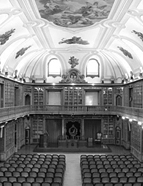

History is also autobiography and, therefore, contemporary history. But this dimension was not yet part of the objective of university historians, beyond sporadic occasions or the scope of some doctoral exam programmes, as well as, effectively, in the Curso de Férias.
The pulse of life can be expressed in many ways, but living history can be muzzled by the language through which it is expressed. In fact, and in the words of Frederick J. Teggart (Theory, 1960, p. 12) in 1918, by becoming a science, history eliminated «all literary ornaments and statements without proof» from its narrative. This was the approach adopted by Vasconcelos, although he was not bound by «Rankian passivity and neutrality» (Carreras Ares). It is a fact that the Theology professor was criticised in 1894 by Mendes dos Remédios, who was only a graduate at the time, on the emergence of his first historical attempt (Evolução do culto de D. Isabel de Aragão [Evolution of the cult of D. Isabel of Aragon]), for excessive erudition and a lack of literary ornament. He would have liked the author, who «investigates, assesses, interprets, analyses, dissects», to have «refrained from over-indulging in his mission as researcher and critic. He said what he wanted to say in as few words as possible, paying little attention to ornament». But the subject to be addressed, in the opinion of Mendes dos Remédios, required «the harmony of historical accuracy and artistic-verbal form" ("D. Isabel de Aragon", O Instituto [The Institute], 41, 1894, p. 916-917). However, this proposal bore no fruit and A. de Vasconcelos' style remained quite different from the "chaste and musical" (L. S. de Matos) style of Gonçalves Cerejeira in Eugénio de Castro's time. Additionally, in 1996, the president of the Lisbon Academy of Sciences acknowledged Vasconcelos, he who was so knowledgeable of the Portuguese language and grammar, «for the clarity of his writing and even the simplicity of his style, so suited to historical studies» (Brás Garcia Mascarenhas, 1996, p. VII). In 1936, Trindade Salgueiro referred to him as «an utter master of the language», besides also «a historian, philologist, exegete, sociologist and artist» (Discurso [Discourse], in Doutor António de Vasconcelos. Homenagem [Homage], Coimbra, 1937, p. 20). Vasconcelos always deemed rhetorical history incapable of becoming scientific.
Within positivism, the actors of history are the agents of progress, which makes it possible to establish a hierarchy of events, favouring those who contribute most to change and who are found in the political sphere (François Dosse). And they were so for many decades, as if Michelet had not existed, despite, for example, Cerejeira having noted in 1917, following others: former «history was an endless rosary of names and dates: one might say that those superior men created all history out of nothing» (Clenardo, vol. I, p. 158).
